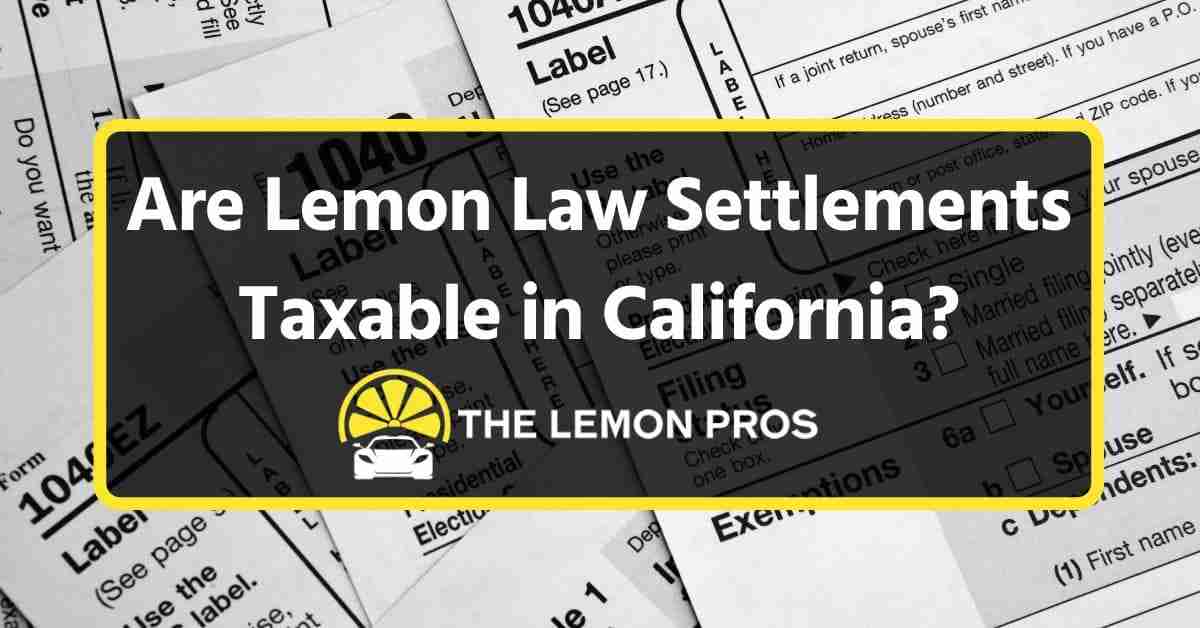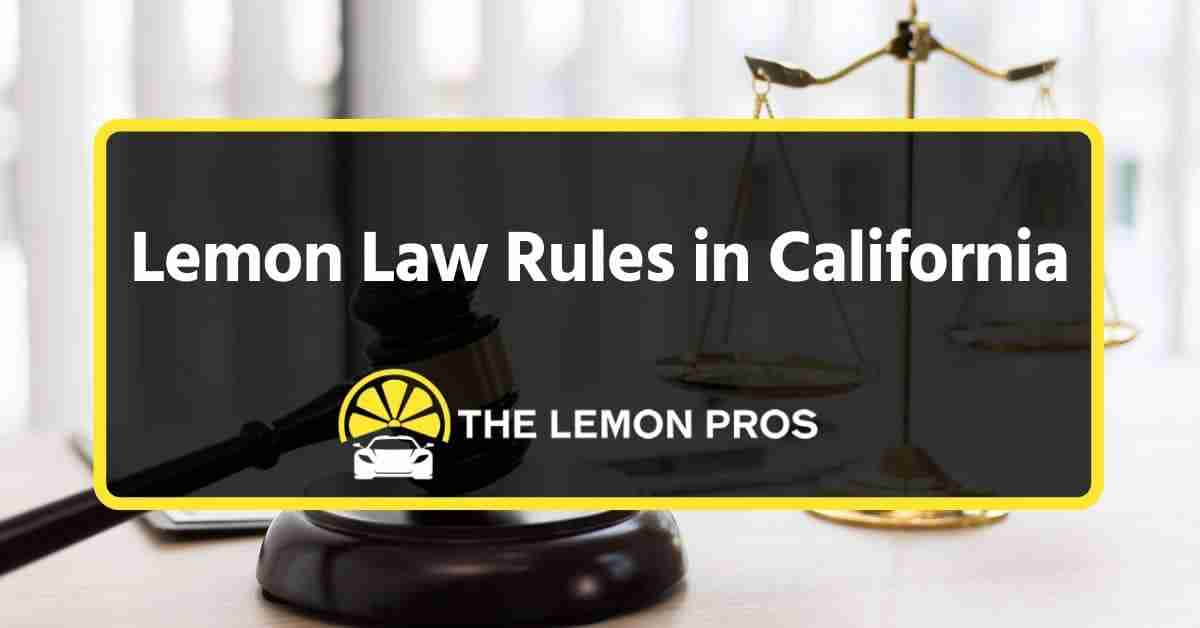
Are Lemon Law Settlements Taxable in California? What you need to Know!
As part of a California Lemon law settlement, you need to understand the various tax implications for the compensation you receive. Both federal tax laws and the state of California are entitled to receive tax money on any income you receive, but the guidelines for Lemon law cases can be difficult to understand. Most of the compensation is not taxable, especially if it’s meant to purchase back the defective vehicle, but there can be some exceptions to that rule.
Trying to navigate a Lemon law claim and the settlement that comes from it doesn’t have to be confusing when you have The Lemon Pros on your team. After helping thousands of clients in California earn compensation for defective vehicles, we are ready to take on your case. Contact us for your free case evaluation.
While it’s always best to discuss the matter with a tax professional, this article serves as a general resource for you, answering whether Lemon law settlements are taxable in California. We discuss the taxes involved in an average Lemon law settlement agreement, talk about the role of the Internal Revenue Service (IRS), and explain a little bit about your obligation concerning attorney’s fees.es.
Table Of Contents
What Is California Lemon Law?

The Song Beverly Consumer Warranty Act, otherwise known as California Lemon Law, protects consumers who have purchased or leased a defective car. It holds the manufacturer or dealer responsible when a defect becomes unrepairable.
For a vehicle to qualify as a lemon and be covered under Lemon Law, it must meet the following requirements:
- The vehicle must be covered by a manufacturer’s warranty. With used cars, there’s some coverage available if there’s a warranty provided. The defect in question must be covered under these warranties.
- Any defect must substantially impair the vehicle’s use, value or safety. This broad condition includes most unrepairable defects.
- The defect must emerge within 18,000 miles or 18 months of taking ownership of the vehicle. While the California Lemon law time limit is longer to file, the first complaint must be documented within these first months or miles.
- You must have given an authorized dealership an appropriate amount of time to fix the complaint. For serious safety issues, only two visits are required. Otherwise, there must be a minimum of four attempts to repair the defect before a claim can be filed.
Lemon law settlements ensure compensation to customers for their defective vehicles. They also serve to make restitution for any additional expenses and inconveniences that are incurred, especially if there have been personal physical injuries involved.
Types of Lemon Law Settlements
Depending on the outcome of your Lemon law settlement agreement, you may end up with one of the following resolutions:
Lemon Law Buyback
A Lemon law buyback occurs whenthe manufacturer repurchases the vehicle. It’s unlikely that you’ll receive the full price back, as the amount is calculated from the time that the problem first started. As part of the buyback, you will need to surrender the car to the dealer or manufacturer. To help estimate the amount that the manufacturer may owe you, use our convenient Lemon law buyback calculator.
Replacement Vehicle
The dealer or manufacturer may choose to give you a new, comparable vehicle in exchange for the defective one. You would be given a similar car based on the fair market value and your purchase price. This vehicle must also be defect-free, or you will be able to file another Lemon law claim.
Cash Settlement
In some cases, the manufacturer will pay you to keep the vehicle, known as a cash-and-keep settlement. This refund of your money is for the inconvenience and is usually only offered if the defect is something that can be lived with. Once you are paid, there can no longer be any more claims about this defect, so that’s something to consider.
Are Lemon Law Settlements Taxable in California?

Do you have to pay taxes on a Lemon law settlement? The California Franchise Tax Board is responsible for collecting all of the taxes in the state, and it differs from federal guidelines, so you may be responsible for paying both in the end. However, most Lemon law claims are considered tax-free due to them being compensation for a defective vehicle you already paid for.
Whenever you are compensated for something that you’ve already paid for or a loss you’ve incurred, it’s not normally taxed. That’s how the federal and state tax authorities look at the compensation you get for having a defective vehicle. You are simply receiving the money back that you’ve already spent, meaning it’s not considered income.
There are some exceptions to these rules. For example, if money is paid to a customer for interest or punitive damages, these settlements may be considered taxable. There are also different regulations for vehicles used personally versus those that are commercial, so it’s always best to consult with your tax professional to find out how to report Lemon law settlement on taxes.
Tax Treatment of a California Lemon Law Settlement and Legal Fees
Revisiting the various Lemon law settlement options outlined above, let’s examine whether you may be responsible for taxes or not. A Lemon law buyback isn’t going to be considered income because you are simply receiving back the money you’ve already spent on the car. This money can then be used to purchase another vehicle.
The same is true with replacement vehicles. Because you are being supplied with a vehicle of equal value to the one you surrender, there are no taxes involved. However, a cash settlement may have different implications. Because this money isn’t being provided as a refund but rather compensation, you may be liable for some taxes.
It’s important to evaluate the role of legal fees in the mix as well. Any attorney fees are considered an expense. Therefore, the amount paid to the attorneys may be deductible from your final taxation evaluation.
IRS Rules and Role of California Franchise Tax Board
The Internal Revenue Service (IRS) is responsible for federal taxes, while the California Franchise Tax Board oversees everything within the state. Both have civil code sections regarding property settlements, such as those occurring with vehicles. Here are a few of the codes and regulations worth researching further:
Internal Revenue Code (IRC) Section 104: This section relates to any compensatory damages, stating that any compensation for physical sickness or physical injury is not taxable. On the other hand, punitive damages and compensation for emotional distress can be seen as income and are, therefore, taxable.
IRC Section 61: Through this section, we receive the definition of gross income. Basically, it’s defined as all income from any source that isn’t excluded by law. Under this section, some settlements for interest and punitive damages could be considered taxable.
IRS Publication 4345: In this publication, deeper insight is given about judgments and settlements, although there’s no direct reference to Lemon law settlements.
California Revenue and Taxation Code (RTC) Section 17201: This reference applies directly to California law, defining gross income and the connection to what is considered taxable.
What to Do After Receiving a Settlement?

Once you receive the reimbursement payment or replacement vehicle, you want to reach out to a tax professional. While an attorney can supply some general information, only an accountant is going to understand how this settlement affects your tax return. You will need to report the settlement in some cases, and this is done by a professional who has knowledge in this area.
You also want to continue to keep a record of everything that occurred. You want the original documentation that was needed to file the claim, along with any records from the payout and settlement.
What Are the Average California Lemon Law Settlements?
The Lemon law settlement in California is typically between $5,000 and $100,000, depending on the type of vehicle you drive, how long you’ve had it, and the severity of the defects,while the average tends to be between $40,000 to $50,000.A consultation with a qualified attorney can help you estimate a possible settlement so you know what to expect.
6 Tips to Maximize Your Settlement Agreement
As a consumer dealing with a defective car, you want to do everything in your power to receive as much back as possible. A few simple tips will help you to get the most out of your Lemon law settlement:
- Start by documenting everything. By having all of the evidence documented and in order, you have a better chance of proving your Lemon law case. You also have the necessary documentation to get the compensation for smaller expenses, such as tow bills.
- Spend time understanding your rights and learning about local laws. Knowledge is power in this situation, so it’s wise to read up on the regulations.
- Don’t attempt to file a claim without an experienced lemon lawyer. The Lemon Pros specialize in claims for defective vehicles and know how to work with the manufacturers for positive outcomes. Contact us for a free consultation to see what you may be owed.
- Calculate all of your damages. If there were medical bills, rental car expenses or other things that you put money out for, make sure these are included with the request.
- Consider your settlement options. As a consumer, you have several options to consider. Determine which of the settlement choices may suit your needs best and be willing to push for that one. Even though that’s the option you want, it’s also good to be willing to negotiate if the right settlement comes along.
- Pay close attention to all deadlines. You don’t want to miss out on compensation because you forgot about a deadline. A qualified lawyer will handle most of this for you, ensuring that you have less to stress about.
Potential Mistakes and How to Avoid Them

Making a mistake can cost you plenty in the end. To avoid penalties, consider these helpful tips:
Keep proper records. Document everything, including the settlement amount and show the paperwork to your tax professional.
Avoid filing on your own. Even if you know a little about taxes, the regulations can be tricky when dealing with a Lemon law settlement. Let a professional help with the process.
Choose an expert. Do research before choosing a tax professional. Ask friends and family for recommendations or read online reviews.
In addition to hiring a tax expert, don’t forget to take advantage of having a Lemon law attorney. Your experienced attorney is available after the settlement in the same way they were during the claim. While they aren’t going to have all of the tax answers available for you, they can lead you in the right direction.
Need Help with a Lemon Law Claim?
A Lemon law claim and its tax implications are not something you can take on yourself. It’s essential to have a professional lemon lawyer and tax advisor on your team before embarking on this journey. Otherwise, you could be caught off-guard by the tax ramifications that occur from your settlement.
The Lemon Pros understand how to work with the auto manufacturers to get the settlement you deserve. We’ve secured millions in previous settlements and are prepared to fight for yours as well. Visit today to find out why we are the best Lemon law attorneys in California, or contact us for a free consultation.






